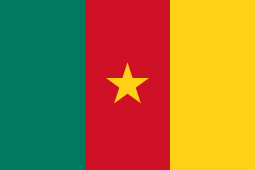Religion in Cameroon
Christianity, Islam and Traditionalist are the three main religions in Cameroon. Christian churches and Muslim centers of various denominations operate freely throughout Cameroon while the traditionalists operate in their shrines and temples which are also becoming popular today. United States Bureau of Democracy, Human Rights and Labor (2010) and Wayi E. Mico (2016). A social analysis of the Religious situation in Cameroon. This article incorporates text from this source, which is in the public domain.The Christian population is divided between Roman Catholics (32.4 percent of the total population), Protestants (30.3 percent), and other Christian denominations (including Jehovah's Witnesses) 6 percent).[2] The vast majority of the Muslims are Sunni belonging to Maliki school of jurisprudence, with approximately 12% Ahmadiyya and 3% Shia.[3] Christians and Muslims are found in every region, although Christians are chiefly in the southern and western provinces.
Religion in Cameroon (2011)[1]
| Part of a series on the |
| Culture of Cameroon |
|---|
 |
| History |
| People |
| Languages |
| Cuisine |
| Religion |
| Art |
| Literature |
|
Music and performing arts |
|
Media |
| Sport |
|
Monuments
|
|
Symbols |
|
The two Anglophone provinces of the western region are largely Protestant, and the Francophone provinces of the southern and western regions are largely Catholic and Evangelicals.[2] In the northern provinces, the locally dominant Fulani (Fula: Fulɓe; French: Peul or Peuhl) ethnic group is mostly Muslim. The Bamoun ethnic group of the West Province is largely Muslim.[2] Traditional indigenous religious beliefs are practiced in rural areas throughout the country but rarely are practiced publicly in cities, in part because many indigenous religious groups are intrinsically local in character.[2]
There are about 4,000 adherents of the Bahá'í Faith in the country.[4] By 2001 the Bahá'í National Spiritual Assembly was registered with the Government of Cameroon as one of the few non-Christian foreign religions.[5] There is a tiny population of Jews in Cameroon who have established ties with the wider global Jewish community. A community of approximately 50 people practice some form of Judaism in the country today .Hinduism is the faith practiced by some South Asian migrants. The Constitution provides for freedom of religion in Cameroon, and the government generally respects this right in practice.[2] The country is generally characterized by a high degree of religious tolerance.[2]
See also
- Freedom of religion in Cameroon
- Islam in Cameroon
- Roman Catholicism in Cameroon
- Bahá'í Faith in Cameroon
- Judaism in Cameroon
- Zamba (god)
References
- "Archived copy". Archived from the original on 2014-07-14. Retrieved 2014-06-13.CS1 maint: archived copy as title (link)
- July-December, 2010 International Religious Freedom Report : Cameroon. United States Bureau of Democracy, Human Rights and Labor (2010) and Wayi E. Mico (2016),A social analysis of the Religious situation in Cameroon. This article incorporates text from this source, which is in the public domain.
- "The World's Muslims: Unity and Diversity" (PDF). Pew Forum on Religious & Public life. August 9, 2012. Retrieved April 6, 2014.
- Bahá'í International Community (2003-09-23), "Cameroon celebrates golden time", Bahá'í World News Service
- Bureau of Democracy, Human Rights, and Labor (2001-10-26), Cameroon - International Religious Freedom Report, U.S. State DepartmentCS1 maint: multiple names: authors list (link)